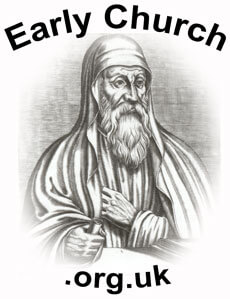Epiphanius of Salamis
(c. 315-403)
Theology on the Web helps over 2.5 million people every year to find high quality theological resources that will help to equip them to serve God and to know Him better (2 Timothy 2:15). Like other websites that provide free services, it is dependent on donations to enable it to grow and develop and only 0.004% of visitors currently do so. If you would like to support this site, please use one of the options to the right of this message.
Synopsis
EPIPHANIUS, Bishop of Constantia (the old Salamis of Cyprus), was b. in the beginning of the fourth century, at Besandirke, a village of Palestine, in the vicinity of Eleutheropolis, and educated among monks. He afterwards lived for some time in Egypt, also among monks, and founded, after his return to Palestine, a monastery in his native town, of which lie became abbot. His fame for holiness brought him to the metropolitan chair of Constantia (367), and from that time he took an active part in the theological controversies of his age. He was present at a synod in Antioch (376), and at another in Rome (382), where the trinitarian questions were debated. lie went to Palestine in 394 to crush the influence of the famous Origen, and to Constantinople in 403 for the same purpose. He died on board the ship on which he was returning from Constantinople to Constantia (spring 403).
The life of Epiphanius fell in a period when monasticism - sprung from the martyr-inspiration of the primitive Church, and hailed by the age as a higher standard of virtue - spread rapidly in the East, but at the same time assumed a character of narrow hostility to all free theological investigation, always preferring a system of stiff dogmatical definitions to the life’ of a vigorous personal conviction. But the man’s character [744] was well suited to the demands of the time; and he, as well as his friends, considered it a great merit to spend a whole life in bitter opposition to the greatest genius the Eastern Church ever produced, without understanding him. He seems, however, to have discovered during his stay in Constantinople, - whither he went at the instance of Theophilus of Alexandria, and for the purpose of opposing Chrysostom, and through him Origen, - that he had in most cases been a tool only in other men’s hands. He left the city abruptly and in a rage.
His principal works are, [Panarion]… (" the drug-chest"), a description and refutation of eighty different heresies, confused and trivial, but of historical value, and … ("the anchor of faith"), a dogmatical work, much read in its time. A life of him by a friend was edited, together with his works, by Petan, Paris, 1822. 2 vols. fol.
Semisch, "EPIPHANIUS," Philip Schaff, ed., A Religious Encyclopaedia or Dictionary of Biblical, Historical, Doctrinal, and Practical Theology, 3rd edn., Vol. 2. Toronto, New York & London: Funk & Wagnalls Company, 1894. pp.743-744.
Primary Sources
| J.E. Dean, Epiphanius' Treatise on Weights and Measures: The Syraic Version. Chicago: University of Chicago Press, 1935. | |
| Epiphanius of Salamis, Weights and Measures (1935) (Tertullian Home Page) | |
| Frank Williams, Translator, "The Panarion of Epiphanius of Salamis," Nag Hammadi and Manichaean Studies, Vol. 35. Leiden: E.J. Brill, 1994. ISBN's: 9004079262. | |
| Frank Williams, Translator, "The Panarion of Epiphanius of Salamis," Nag Hammadi and Manichaean Studies, Vol. 36. Leiden: E.J. Brill, 1994. ISBN:9004098984. |
Secondary Sources
| M. Bregman, "(Lk 14:13s) The Parable of the Lame and the Blind; (Panarion 64m70.5-17) Epiphanius' Quotation From an Apocryphon of Ezekiel," Journal of Theological Studies 42 (1991): 125-38. | |
| V. Burrus, "The Heretical Woman as Symbol in (bishop) Alexander, Athanasius, Epiphanius, and Jerome," Harvard Theological Review 84 (1991): 229-48. | |
| Jon Dechow, Dogma and Mysticism in Early Christianity: Epiphanius of Cyprus and the Legacy of Origen. Macon: Mercer University Press, 1988. Hbk. ISBN: 0865543119. | |
| Carroll D. Osburn, The Text of the Apostolos in Epiphanius of Salamis. Leiden: Brill, 2005. ISBN: 9004130586. pp.284. | |
| James R. Edwards, "The Gospel of the Ebionites and the Gospel of Luke," New Testament Studies 48.4 (2002): 568-586. | |
 Carroll D. Osburn, The Text of the
Apostolos in Epiphanius of Salamis. Society of Biblical Literature - The
New Testement in the Greek Fathers Series. Leiden: Brill, 2004. Hbk. ISBN:
9004130586. pp.298. Carroll D. Osburn, The Text of the
Apostolos in Epiphanius of Salamis. Society of Biblical Literature - The
New Testement in the Greek Fathers Series. Leiden: Brill, 2004. Hbk. ISBN:
9004130586. pp.298. |
|
| M.E. Stone, "Concerning the Seventy-Two Translators: Armenian Fragments of Epiphanius, On Weights and Measures," Harvard Theological Review 73 (1980): 331-76. | |
 |
 Gerard
Vallée, A Study in Anti-Gnostic Polemics: Irenaeus, Hippolytus, and
Epiphanius. Studies in Christianity and Judaism, 1. Waterloo: Wilfred
Laurier University Press, 1981, 2006. ISBN: 9780889205741. pp.126. [Sign-up to Perlego and access book instantly] Gerard
Vallée, A Study in Anti-Gnostic Polemics: Irenaeus, Hippolytus, and
Epiphanius. Studies in Christianity and Judaism, 1. Waterloo: Wilfred
Laurier University Press, 1981, 2006. ISBN: 9780889205741. pp.126. [Sign-up to Perlego and access book instantly] |
| Francis Young, "Did Epiphanius Know What He Meant by 'Heresy'?" Studia Patrsitica, Vol. 17, No.1. (1982): 199-205. |
Related Subjects
 |
|
 |
|
 |








